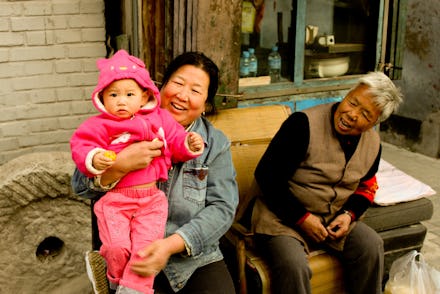Why I Love My Strict Asian Parents

Last week, Huffington Post contributor Sue Nador wrote a short blog post about her "tough love" approach to parenting. One year, for example, when her younger son Micah finished in the middle of the pack in a regional running race, Nador said she cursed at him because she had seen him perform better.
"Don't get me wrong — if he really was an average runner I'd be the one cheering the loudest at the finish line and taking him out for double hot fudge sundaes with extra sprinkles later," she explained. "But since he was no average runner, what would it say to him if I was congratulating him for performing average?"
This sort of parenting is common in many contemporary Asian-American families; many of us have grown up hearing more criticisms than compliments. It has also been the focus of controversy, since critics believe that, applied excessively, these techniques can alienate children from their parents and hurt their productivity. But these critics often miss the point.
For many Asian-American millennials, like me, who grew up with strict parents, the benefits of tough love have far outweighed its drawbacks.
Perhaps the most famous recent example of Asian parents who espouse "tough love" is "tiger mother," author, and Yale professor Amy Chua.
Image via Tiger Mom Says.
Chua's vivid descriptions of her strict parenting style in a 2011 essay for the Wall Street Journal titled "Why Chinese Mothers Are Superior" prompted widespread criticism and a string of articles denouncing or analyzing the meaning of "tiger moms." In describing her daughters' strictly regulated lives, Chua observed, "What Chinese parents understand is that nothing is fun until you're good at it."
Not all readers agreed. Many non-Asians and Asian-Americans alike argued that in being overly demanding, Chua hurt her daughters' self-esteem. Others suggested that her tiger claws might scar her children for life.
"You see, growing up in a home like Chua's was no piece of cake, and although I'm close to 40 now, I still bear wounds that haven't healed," wrote psychologist and business executive Lac Su in a piece for CNN.
But that wasn't the case for me. While I often felt pressure to succeed in whatever I did and rarely felt appreciated during my childhood, now that I'm much older, I understand that this tough love was necessary, both for my personal growth and the growth of my relationship with my parents.
When I was young, my father would discipline me in ways that many non-Asian milliennials would think of as brutal and unnecessary. One night, for instance, he cracked the back end of a feather duster while hitting me with it because I didn't want to finish a class project that was due the next day. Another time, he made me sit at our dinner table until midnight because I had refused to eat the salmon my mother had cooked.
Naturally, these kinds of discipline led to a lot of friction. I frequently took issue with my father's parenting methods. We would argue vehemently until I finally relented and listened to him.
What I didn't realize I was learning from these incidents was the concept of filial piety, a fundamental Confucian value which Chinese-American, Korean-American, and Japanese-American families often hold in high regard. Under this system, "[p]arents and elders wield greater authority and should be treated with respect and obedience," according to researchers Ruth Chao and Vivian Tseng. "Children often continue to seek their parents' advice and guidance throughout their adulthood."
While I may have disagreed with his methods, I can't argue with my father's results.
When he pushed me to get straight A's in school by occasionally beating me or insulting me, I learned how to become independent and how to motivate myself. By the time I was in high school, I didn't need him to constantly discipline me or to tell me that I could do better in my classes. I disciplined myself whenever I struggled on my own; taking less breaks, hanging out less with friends and spending more time studying. My discipline meant that I got better grades, got into a good college, and eventually landed a job in my desired profession.
As I've grown older, I've learned to appreciate my father a lot more. Looking back, I know he never once thought that I was a good-for-nothing idiot. In fact, he believed I could accomplish great things with an extra bit of motivation.
Sure, he used unconventional means to discipline me, but he never lost sight of the fact that I was his son. Every birthday and Christmas, he would make a sincere effort to get what I wanted. From time to time, he would surprise me with a little gift just to show that he cared.
When I was young, I never understood these little moments of gratitude because I only saw my father as a disciplinarian and nothing more. But now, I reflect on them and my childhood with a sense of understanding and appreciation.
Not everyone had "tough love" parents. Not everyone can understand the value of tiger moms. Not everyone had my experience. And that's OK.
As we young Asian-Americans come of age, many of us are still trying to come to terms with the relationship we had with our parents when we were young — for some, the experience was harrowing; for others, life-changing. But as we grow older, we tend to realize that our parents tried to act in our best interests.